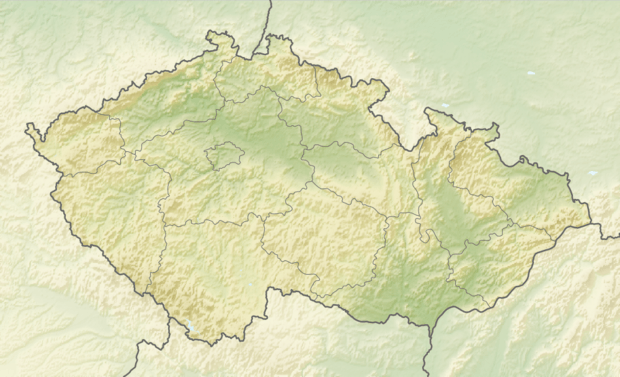Horní Benešov
Horní Benešov (Czech pronunciation: [ˈɦorɲiː ˈbɛnɛʃof]; Benešov until 1926, German: Bennisch) is a small town in the Moravian-Silesian Region of the Czech Republic. From 1938 to 1945 it was one of the municipalities in Sudetenland. Benešov has a long mining tradition.
Horní Benešov | |
|---|---|
Town | |
Saint Catherine Church | |
 Flag  Coat of arms | |
 Horní Benešov Location in the Czech Republic | |
| Coordinates: 49°58′0″N 17°36′10″E | |
| Country | Czech Republic |
| Region | Moravian-Silesian |
| District | Bruntál |
| Founded | 1253 |
| Government | |
| • Mayor | Pavel König |
| Area | |
| • Total | 20.40 km2 (7.88 sq mi) |
| Elevation | 568 m (1,864 ft) |
| Population (2019-01-01[1]) | |
| • Total | 2,253 |
| • Density | 110/km2 (290/sq mi) |
| Time zone | UTC+1 (CET) |
| • Summer (DST) | UTC+2 (CEST) |
| Postal code | 793 12 |
| Website | www |
History and population
It started as a mining settlement at the beginning of the 13th century. The town was officially founded in 1253, and the rights were confirmed in 1271 by the Bohemian King Přemysl Otakar II. It was destroyed by a Hungarian invasion in 1474 and then during the Thirty Years' War. The mining was in decline since 17th century. During the 19th and 20th centuries, economic development of Benešov was driven mostly by textile industry.

According to the Austrian administration census of 1910 the town had 3,826 inhabitants, 3,807 of whom had permanent residence there. Census asked people for their native language, 3,800 (99.9%) were German-speaking. Most populous religious groups were Roman Catholics with 3,766 (98.4%), followed by Protestants with 30 (0.8%) and the Jews with 25 (0.6%).[2]
John Kerry's ancestry
The town gained some attention when it was learned that Fritz Kohn, the paternal grandfather of John Kerry, the U.S. Democratic Party's candidate for United States President in the 2004 election, was from Horní Benešov. Kohn, who was born to a Jewish family here, changed his name to Kerry and converted to Catholicism before emigrating to the U.S. in 1905.
When Kohn was born, the town was populated almost entirely by ethnic Germans with only a very small German-speaking Jewish community, and was part of the Silesia region of Austria-Hungary. After World War I, the town was within the state of Czechoslovakia and in 1926 was given its present name. Today it is almost entirely Czech after the post-1945 expulsion of Germans from Czechoslovakia.
Twin towns — sister cities
Horní Benešov is twinned with:
References
- "Population of municipalities of the Czech republic". Czech Statistical Office. Retrieved 2019-04-30.
- Ludwig Patryn (ed): Die Ergebnisse der Volkszählung vom 31. Dezember 1910 in Schlesien, Troppau 1912.
External links
| Wikimedia Commons has media related to Horní Benešov. |